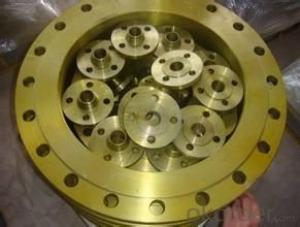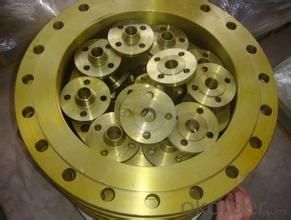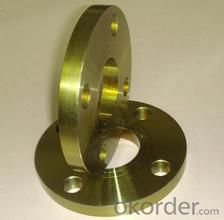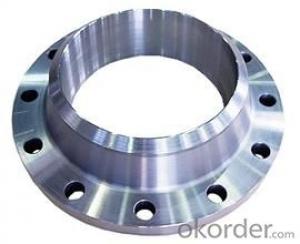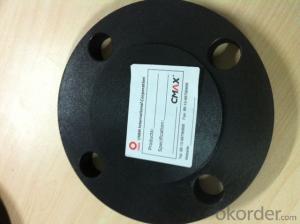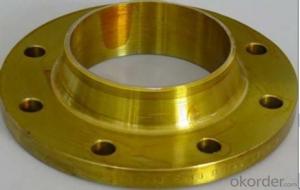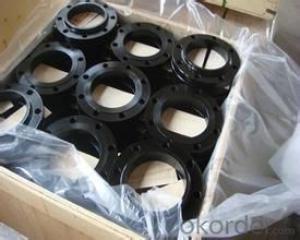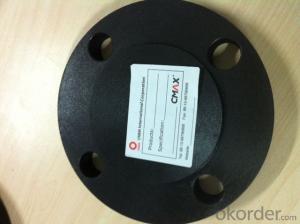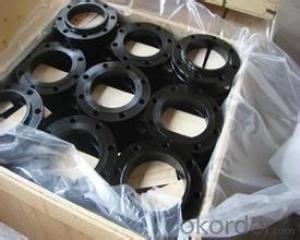CARBON STEEL FORGED BLIND FLANGES A105 ANSI B16.5 best price
- Loading Port:
- Tianjin
- Payment Terms:
- TT OR LC
- Min Order Qty:
- 10 m.t.
- Supply Capability:
- 10000 m.t./month
OKorder Service Pledge
OKorder Financial Service
You Might Also Like
Package Of Carbon Steel Flange:
PACKED IN PLYWOOD CASES OR PALLETS
Painting Of Carbon Steel Flange:
BLACK OR YELLOW PAINTING FOR CARBON STEEL
Marking Of Carbon Steel Flange:
REFER TO MARKING DOCUMENT or AS PER CUSTOMER REQUEST
Shipping Marks Of Carbon Steel Flange:
EACH WOODEN BOX TWO PLASTIC SHIPPING MARKS
Specification Of Carbon Steel Flange:
Carbon Steel Flange Slip On Flange, Plate Flange, Blind Flange, Welding Neck Flange, Socket Welded Flange, Thread Flange, Lap Joint Flange, Long Welding Neck Flange
Size : 1/2"-48"
Wall Thickness.: SCH10-SCH160, SGP , XS, XXS, DIN ,STD
| Name | Carbon Steel Flange |
| Size | 1/2" - 48" |
| Face | RF, FF, RTJ |
| Wall thickness | Sch5-Sch160 XXS,STD,XS, SGP |
| Standard | ASME B16.5, B16.47, BS4504, JIS B2220, API 6A, 11Detc. |
| We can also produce according to drawing and standards provided by customers. | |
| Material | ASTM A105, A350 LF1, LF2, F11, F12, St35.8, St45.8, 15Mo3etc, |
| Packaging | Wooden Cases, wooden pallet , or carton box , or nylog bag and then in wooden cases |
| Surface Treatment | Paintting black or yellow color, or Anti-rust Oil |
| Delivery Time | 20-30 days, after received advance payment. |
| Quality | 100% Heat Treatment, No Welding repair |
| Others | 1.Special design available according to your drawing. |
| 2.anti-corrosion and high-temperature resistant with black painting | |
| 3. All the production process are made under the ISO9001:2000 strictly. | |
| 4. A conformity rate of ex-factory inspection of products. | |
| 5. we have export right , offering FOB , CNF CIF price |
STANDARD & MATERIAL GRADE
STAMDARD Of Carbon Steel Flange
| Standard | Pressure | Size | |
| European Standard | EN 1092-1 | Class PN6 ~ PN100 | DN10 ~ DN4000 |
| American Standard | ASME B16.5 | Class 150 ~ 2500 | 1/2" ~ 24" |
| ASME B16.47A | Class 150 ~ 900 | 26" ~ 60" | |
| ASME B16.47B | Class 75 ~ 900 | 26" ~ 60" | |
| German Standard | DIN 2527,2566,2573, 2576, 2627-2638,2641,2642,2655,2656 | PN6~PN100 | DN10 ~ DN4000 |
| Australian Standard | AS2129 | Table: T/A, T/D, T/E, T/F, T/H, T/J, T/K, T/R, T/S, T/T | DN15 ~ DN3000 |
| AS4087 | PN16 ~ PN35 | DN50 ~ DN1200 | |
| British Standard | BS4504 | PN2.5 ~ PN40 | DN10 ~ DN4000 |
| BS10 | T/A, T/D, T/E, T/F, T/H | 1/2" ~ 48" | |
| Japanese Standard | JIS B2220 | 5K ~ 30K | DN10 ~ DN1500 |
| API Standard | API 6A, 11D | 2000 PSI ~ 20000 PSI | 1 13/16" ~ 30" |
| French Standard | NFE 29203 | PN2.5 ~ PN420 | DN10 ~ DN600 |
MATERIAL Of Carbon Steel Flange
| Carbon Steel | ||
| Material Standard | Material Grade | |
| ASTM | ASTM A105 | A105, A105N |
| ASTM A350 | A350 LF1, LF2 | |
| ASTM A182 | F11, F12, F22 | |
| ASTM A106 | A, B, C | |
| DIN EN | DIN17175 | St35.8, St45.8, 15Mo3 |
| EN10216-2 | 195GH,P235GH, P265GH, 20MnNb6 | |
| JIS | JIS G3461 | STB340,410,510 |
| JIS G3462 | STBA12, 13, 20, 22, 23, 24 | |
| JIS G3454,G3455,G3456 | STPG 370, STB410, STS370,410, 510 | |
| STPT 370, 410, 480 | ||
- Q: What is the role of steel pipes in the telecommunications industry?
- Steel pipes play a crucial role in the telecommunications industry as they are used for the installation of underground and overhead telecommunication cables. These pipes provide protection and support to the cables, ensuring their safety and longevity. Additionally, steel pipes are also used in the construction of communication towers and infrastructure, making them an essential component in establishing and maintaining reliable telecommunications networks.
- Q: How are steel pipes used in the telecommunications network infrastructure?
- Steel pipes have a wide range of applications within the telecommunications network infrastructure. Underground cable conduits are one of the main uses of steel pipes in this industry. These conduits are responsible for safeguarding telecommunications cables from various external factors, including moisture, rodents, and physical damage. By providing exceptional strength and durability, steel pipes ensure the long-term protection of these cables. Furthermore, steel pipes are indispensable in the construction of telecom towers and antenna masts. These structures must possess robustness and resilience to withstand adverse weather conditions. Steel pipes offer the necessary strength, stability, and durability required for telecom towers to support antennas and other equipment. Additionally, their ease of assembly enables efficient deployment and maintenance of the network infrastructure. Additionally, steel pipes are crucial in the installation of fiber optic cables. Fiber optic cables transmit data at high speeds through the use of light signals. To ensure optimal performance, it is imperative to protect these cables from any external interference. Steel pipes serve as conduits for fiber optic cables, effectively shielding them from electromagnetic interference and other potential disruptions. To summarize, steel pipes play a vital role in the telecommunications network infrastructure. They are utilized for the installation of underground cable conduits, construction of telecom towers, and protection of fiber optic cables. The strength, durability, and versatility of steel pipes make them an ideal choice for guaranteeing the reliability and functionality of telecommunications systems.
- Q: Can steel pipes be used in the oil and gas industry?
- Yes, steel pipes are commonly used in the oil and gas industry. Steel pipes are known for their strength, durability, and resistance to corrosion, making them suitable for transporting and storing various fluids and gases in the industry. These pipes can withstand high pressure and extreme temperatures, which are often encountered in oil and gas operations. Additionally, steel pipes can be easily welded together, allowing for efficient assembly and maintenance. Overall, steel pipes are a reliable and cost-effective choice for the oil and gas industry.
- Q: What is the difference between black steel pipes and galvanized steel pipes?
- Black steel pipes and galvanized steel pipes differ in their coating. Black steel pipes are uncoated and have a dark, matte appearance, while galvanized steel pipes are coated with a layer of zinc to prevent corrosion. The galvanization process provides added protection and durability, making galvanized steel pipes suitable for outdoor or high-moisture environments.
- Q: What's the difference between a cracked carbon steel tube and a liquid carbon steel tube?
- If the material is the same, the process is different from the test.
- Q: How are steel pipes used in the manufacturing of food processing machinery and equipment?
- Due to their numerous advantageous properties, steel pipes are essential in the manufacturing of food processing machinery and equipment. They are widely used in the food industry for their durability, ability to withstand high temperatures and pressures, and resistance to corrosion. The primary use of steel pipes in food processing machinery is for transporting fluids and gases. These pipes are responsible for carrying water, steam, liquids, air, and gases throughout the processing plant. By utilizing steel pipes, the food industry can ensure the reliable and hygienic transfer of these substances, maintaining the quality and safety of food products. Steel pipes also play a crucial role in the design and construction of food processing equipment such as mixers, blenders, conveyors, and canning machines. These machines require pipes to facilitate the movement of ingredients, processing fluids, and cleaning agents. Steel pipes, with their high strength, can handle the heavy loads and pressures associated with food processing operations, making them an ideal choice for such applications. Another significant benefit of steel pipes in food processing machinery is their resistance to corrosion. With the use of various acidic and alkaline substances, as well as hot water and steam, corrosion can occur in other materials. However, steel pipes, especially those made from stainless steel, exhibit a high resistance to corrosion. This ensures that the machinery remains in optimal condition, prolonging its lifespan. Furthermore, the smooth internal surface of steel pipes allows for efficient and hygienic cleaning. This minimizes the accumulation of food particles and contaminants, which is crucial in the food industry. By maintaining high levels of cleanliness, the growth of bacteria can be prevented, ensuring food safety. In conclusion, steel pipes are indispensable in the manufacturing of food processing machinery and equipment. Their durability, resistance to corrosion, ability to handle high temperatures and pressures, and hygienic characteristics make them the ideal choice for transporting fluids and gases, as well as constructing various food processing equipment.
- Q: How do you protect steel pipes from rusting?
- There are several ways to prevent rusting in steel pipes. One common method involves applying a protective coating to the pipes. This can be done using paint or other coatings specifically designed for metal surfaces. The coating acts as a barrier between the steel and the elements, stopping moisture and oxygen from reaching the metal and causing rust. Another method is to galvanize the steel pipes. This involves coating them with a layer of zinc, which creates a protective barrier against rust. Galvanizing is often used for outdoor applications or in environments with high moisture levels. Regular maintenance is also important for preventing rust. It is necessary to inspect the pipes for corrosion or damage and address any issues immediately. Keeping the pipes clean and dry can also help prevent rust formation. In some cases, sacrificial anodes can provide additional protection. These anodes, made of zinc or magnesium, are attached to the steel pipes. They corrode instead of the steel, sacrificing themselves to protect the pipes from rust. Proper storage and handling of steel pipes are crucial as well. They should be stored in a dry, well-ventilated area, away from moisture and humidity. Care should be taken to avoid scratching or damaging the protective coatings when handling the pipes. By implementing these methods and practices, steel pipes can be effectively safeguarded against rust, ensuring their longevity and durability.
- Q: What are the different methods of pipe support for steel pipes?
- There are several methods of pipe support for steel pipes, including clamps, hangers, brackets, and guides. Clamps are used to secure pipes to a structure, while hangers suspend the pipes from overhead supports. Brackets provide lateral support and stability, and guides are used to control pipe movement and prevent excessive sagging. These various methods ensure the proper installation and stability of steel pipes in different applications.
- Q: How are steel pipes used in the construction of oil refineries?
- Steel pipes are extensively used in the construction of oil refineries for various purposes. They are primarily used for transporting crude oil, refined petroleum products, and various chemicals within the refinery complex. Steel pipes are also utilized for the distribution of water, steam, and other fluids required for the refining processes. Additionally, they are employed in the construction of equipment such as heat exchangers, reactors, and storage tanks, where they provide structural support and ensure efficient fluid flow. Overall, steel pipes play a critical role in the reliable and safe operation of oil refineries.
- Q: How are steel pipes protected against soil movement or settlement?
- Various methods can be employed to safeguard steel pipes against soil movement or settlement. One prevalent approach involves the utilization of protective coatings on the pipes, which act as a barrier between the steel and the soil. By preventing direct contact and reducing the chance of corrosion, these coatings offer effective protection. Epoxy, polyethylene, and zinc are among the coatings commonly employed for this purpose. Another method entails the implementation of cathodic protection. This technique involves the installation of sacrificial anodes along the pipeline. These anodes corrode instead of the steel pipes, thus shielding them from potential harm caused by soil movement or settlement. Furthermore, ensuring proper design and installation techniques is crucial for protecting steel pipes in these scenarios. Engineers must take into account factors such as soil composition, slope stability, and the likelihood of ground movement when designing the pipeline route. Additionally, employing appropriate trenching and bedding techniques guarantees adequate support and protection against settlement. Regular inspection and maintenance play a crucial role in protecting steel pipes against soil movement or settlement. By monitoring the condition of the pipeline, including the protective coatings and cathodic protection systems, potential issues can be identified promptly, allowing for timely repairs or replacements. In conclusion, a combination of protective coatings, cathodic protection, proper design and installation techniques, and regular maintenance effectively safeguards steel pipes from soil movement or settlement.
Send your message to us
CARBON STEEL FORGED BLIND FLANGES A105 ANSI B16.5 best price
- Loading Port:
- Tianjin
- Payment Terms:
- TT OR LC
- Min Order Qty:
- 10 m.t.
- Supply Capability:
- 10000 m.t./month
OKorder Service Pledge
OKorder Financial Service
Similar products
Hot products
Hot Searches
Related keywords
